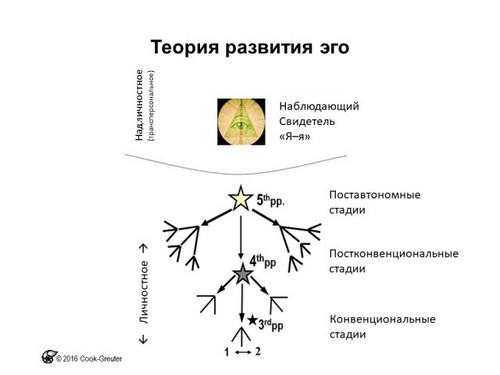Many people, apparently, do not understand that under the development of the ability to take perspectives I mean, mainly, the process of expansion of self-understanding.
Take, for example, one “expert” (self-conscious stage). “Expert” is the first level that has the ability to take the prospect of examining himself as a separate personality. We call it the birth of the psychological “I”.
The individual at this stage acquires the ability to recognize some basic traits and values, which he really should already for some time. It has the ability to look back on your past and consider the many times when he showed, for example, “honesty”. So now he can say, “I’m an honest man.”
Given that this ability develops in parallel the cognitive shift to abstract thinking, it also allows you to get some wider perspective on objective reality. But what the individual at the stage of “expert” still can not do is to adopt the perspective of the inner world of other people. At least, this feature occurs again and again when coaching support individuals on the “expert” stage.

A brief summary of the prospects
Perspective 1st-person. “I can see the world only based on their needs and desires.”
Perspective 2-third person (conformist stage, or the stage of “diplomat”). “I can see you, can you see me (external attributes) and we are mixed (confused) as part of our group.”
Perspective 3rd-person, extended in time (5 – 10 years) (conscientious stage or stage of “castigates“/”rationalist”). “Now I can see the qualities, traits, dreams, and understanding other people.” Linear time and formal operations are part of this understanding, so the focus is on the future and improvements.

The prospect of a 4-person (stage of “individualist”/”pluralist”). “Now I can look back on your past and see how I was programmed background social/cultural and historical processes. Also, I can now understand that others are influenced by the same forces. Therefore, beliefs and perception of all people is still a valuable and reliable”.
Extended the term of the 4th person (the stage of “Autonomous” or stage “strategist”). “Aware of its own unfolding development and change processes”. (As in integral meta-theory, where “the emerald”, the teal, the level is the first stage, aware of the deployment processes of their own development and development of others.) “Aware of the long course of history (evolution as well as the previous generation and of future generations)”.
The prospect of a 5-person (stage “construct-aware” or stage “the alchemist”). For the first time full awareness of the constructed nature of reality, the gap between language and lying for him undifferentiated flow of experience, and human need for storytelling, or storytelling, is used, first, to protect against impermanence and the feelings of insignificance, and second, because nothing else we do as human beings.
Some individuals acquire the ability to realize the ego and its grip on our processes semiclassically, because the ego is able to usurp everything, including spiritual achievements to increase sense of self-importance and power.
Ego-awareness, apparently, beyond the pattern of adoption (and design – approx. lane) more and more complex perspectives on their own smyslopolaganie. Favorable perception of the ego as something that does what it should do, namely, to create a complete and consistent story about himself and the world as a map to navigate in life.
It would be nice if people actually saw the concept of “adoption perspectives” in its relationship with the perception of himself and, of course, with the increasing development in connection with understanding other people, as well as the surrounding context and how we conceptualize the world. Initially, the focus of the perspective is very narrow, but then it expands, including more and more associated with samomyshleniyu areas.


